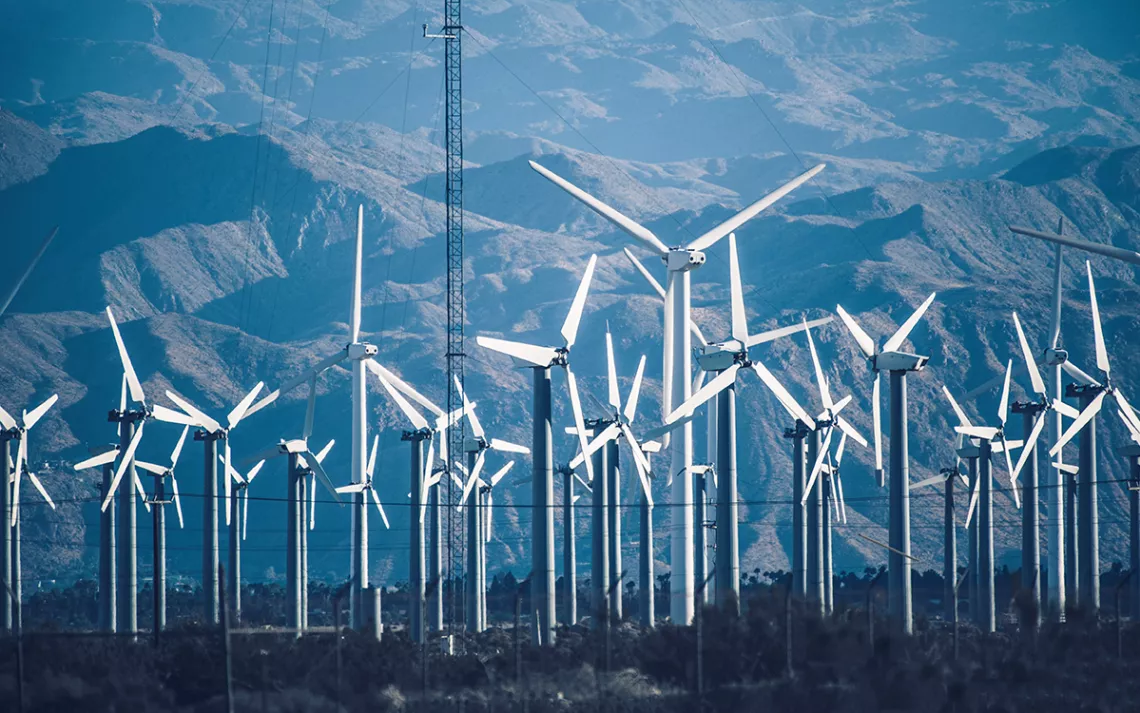California Gets Real About Clean Energy
But environmentalists can’t take all the credit

Photo by
By 2045, the world’s fifth-largest economy will be running on 100 percent clean energy, thanks to a bill signed September 10 by California governor Jerry Brown. The bill that mandated the state to transition to carbon-free electricity, SB 100, has been a long-term goal for the Sierra Club and other environmentalists. Kathryn Phillips, director of the Club’s California Chapter, hopes it will serve as an example beyond the state’s borders. “People watch what we do, and they adopt policies that are the same or similar to what we are adopting,” she said.
Brown signed the historic bill just two days after the People’s Climate March in San Francisco, where more than 30,000 people marched to call for lawmakers to take climate action, and two days ahead of the Global Climate Action Summit. Authored by California state senator Kevin de Leon, it sets benchmarks of 50 percent noncarbon energy by 2026 and 60 percent by 2030.
Beyond the bill's environmental benefits, supporters hope that SB 100 can be a driver for California jobs. A large coalition of California business organizations, including the Silicon Valley Leadership Group and the Los Angeles Business Council, supported the law for just this reason: “While we support the climate and environmental goals of SB 100,” they wrote, “as business leaders and organizations we enthusiastically embrace the economic engine that this bill embodies for California. The quality of these jobs has been and will remain high, supporting skilled workers with family-sustaining compensation and benefits.”
An obvious beneficiary will be the solar industry, which already employs over half a million Californians. Abigail Ross Hopper, CEO of the Solar Energy Industries Association, said, “As the largest solar market in the U.S., California has already proven that investing in renewable energy brings jobs and massive economic and environmental benefits to the state—benefits that will grow exponentially with the enactment of SB 100.”
Phillips credits support from organized labor for the bill’s success. Last year, the bill had been blocked because of opposition from one powerful union (which she declines to name). This year, she said, “that union went neutral, which then opened it up for other labor unions to support, and things started moving.”
“Like all of us, union members need clean air, clean water, and a future for our children,” said San Francisco Labor Council director Rudy Gonzales. “We must demand a just transition and move as rapidly as possible to a system of renewable energy. Everyone needs a job with good pay and a union to defend their rights and working conditions.” UC Berkeley’s Labor Center described clean energy jobs as “a path to the middle class,” especially for people of color. Clean energy jobs in California alone outpace coal jobs in the entire nation by 10 to one, and SB 100 will open up even more.
Passing the law itself is only a starting point, said Phillips. “There is an excitement about bills being passed, but there is a reality that you have to make sure they actually get implemented.” Part of that implementation process is offering support for workers in fossil fuel industries—and offering them jobs in the clean energy sector. Mary Boeve, executive director at 350.org, said, “We’ll need to ensure that the transition to 100 percent clean energy is a just and equitable one that protects workers and prioritizes the needs of the low-income and communities of color who have been the worst impacted by fossil fuels and climate change.”
 The Magazine of The Sierra Club
The Magazine of The Sierra Club



